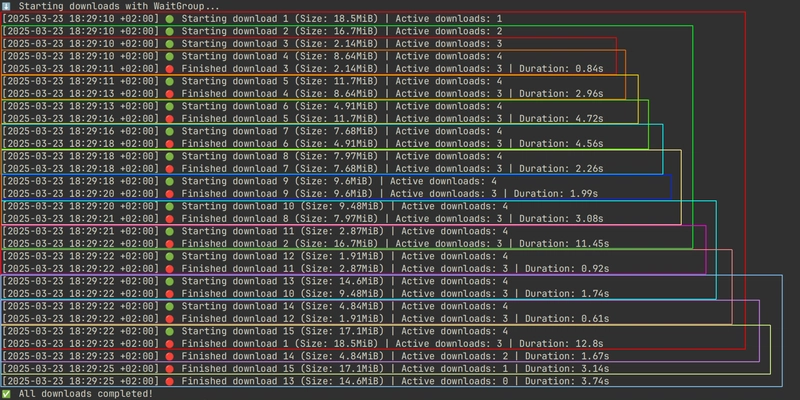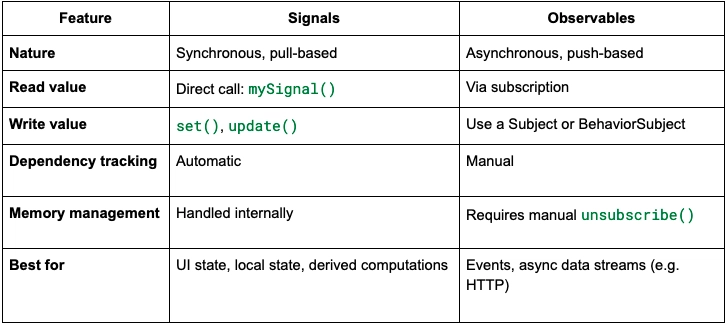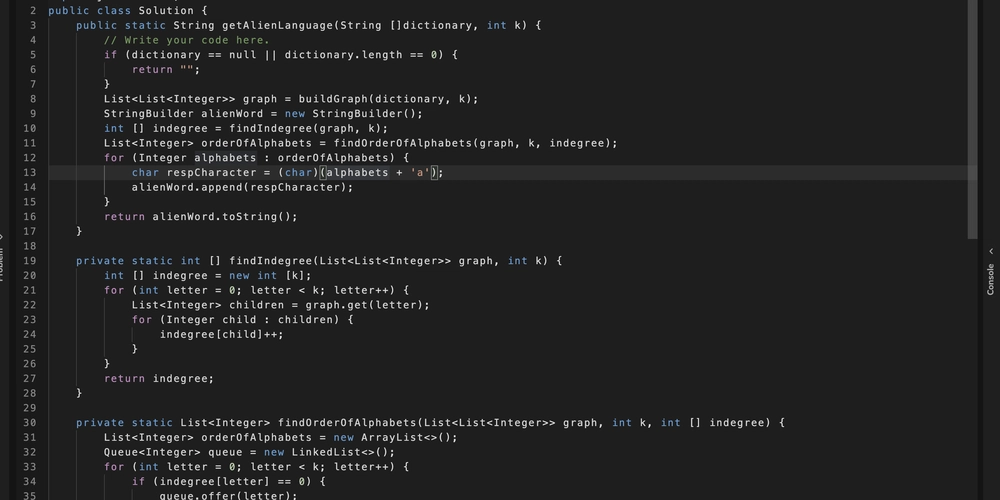Semaphores in Crystal
TL;DR Need to limit how many tasks run at once in your Crystal app? You can implement semaphore-like control using WaitGroup. This article shows how to manage concurrent downloads with just a few lines of code. Why I wrote this article When I started working on a problem that required limiting concurrent downloads in Crystal, I didn't know what semaphores were at all. I just needed a way to control how many threads run at the same time. While searching for a solution, I didn't find any information about using semaphores in Crystal—so I decided to write this article and share what I've learned. What is a semaphore? "Think of semaphores as bouncers at a nightclub. There are a dedicated number of people that are allowed in the club at once. If the club is full no one is allowed to enter, but as soon as one person leaves another person might enter." — Stack Overflow comment https://stackoverflow.com/questions/34519/what-is-a-semaphore/40473#40473 In simpler terms, a semaphore controls access to resources by setting a limit on how many tasks can run concurrently. Implementing semaphore-like behavior in Crystal Crystal doesn't have built-in semaphores, but we can achieve similar control using Atomic counters and WaitGroup. WaitGroup is a simpler and more efficient alternative to using a Channel(Nil). Here's a practical example of concurrent file downloads: require "http/client" require "wait_group" mutex = Mutex.new # Number of concurrent downloads allowed at a time threads = 4 # List of URLs to be downloaded with random sizes download_urls = [] of {String, Int32} 15.times do |i| size = Random.rand(1_000_000..20_000_000) # Random size between 1MB and 20MB url = "http://speedtest.astra.in.ua.prod.hosts.ooklaserver.net:8080/download?size=#{size}" download_urls

TL;DR
Need to limit how many tasks run at once in your Crystal app? You can implement semaphore-like control using WaitGroup. This article shows how to manage concurrent downloads with just a few lines of code.
Why I wrote this article
When I started working on a problem that required limiting concurrent downloads in Crystal, I didn't know what semaphores were at all. I just needed a way to control how many threads run at the same time. While searching for a solution, I didn't find any information about using semaphores in Crystal—so I decided to write this article and share what I've learned.
What is a semaphore?
"Think of semaphores as bouncers at a nightclub. There are a dedicated number of people that are allowed in the club at once. If the club is full no one is allowed to enter, but as soon as one person leaves another person might enter."
— Stack Overflow comment https://stackoverflow.com/questions/34519/what-is-a-semaphore/40473#40473
In simpler terms, a semaphore controls access to resources by setting a limit on how many tasks can run concurrently.
Implementing semaphore-like behavior in Crystal
Crystal doesn't have built-in semaphores, but we can achieve similar control using Atomic counters and WaitGroup.
WaitGroup is a simpler and more efficient alternative to using a Channel(Nil).
Here's a practical example of concurrent file downloads:
require "http/client"
require "wait_group"
mutex = Mutex.new
# Number of concurrent downloads allowed at a time
threads = 4
# List of URLs to be downloaded with random sizes
download_urls = [] of {String, Int32}
15.times do |i|
size = Random.rand(1_000_000..20_000_000) # Random size between 1MB and 20MB
url = "http://speedtest.astra.in.ua.prod.hosts.ooklaserver.net:8080/download?size=#{size}"
download_urls << {url, size}
end
# Atomic counter to track the number of currently active downloads
active_downloads = Atomic(Int32).new(0)
puts "⬇️ Starting downloads with WaitGroup..."
WaitGroup.wait do |wg|
# Process each download URL with concurrency control
download_urls.each_with_index do |(url, size), index|
# Block execution if the number of active downloads reaches the limit
while active_downloads.get >= threads
sleep 10.milliseconds
end
active_downloads.add(1) # Increase the count of active downloads
start_time = Time.local
mutex.synchronize do
puts "[#{start_time}] 








































































































































































![[The AI Show Episode 142]: ChatGPT’s New Image Generator, Studio Ghibli Craze and Backlash, Gemini 2.5, OpenAI Academy, 4o Updates, Vibe Marketing & xAI Acquires X](https://www.marketingaiinstitute.com/hubfs/ep%20142%20cover.png)


























































































































![[FREE EBOOKS] The Kubernetes Bible, The Ultimate Linux Shell Scripting Guide & Four More Best Selling Titles](https://www.javacodegeeks.com/wp-content/uploads/2012/12/jcg-logo.jpg)



![From drop-out to software architect with Jason Lengstorf [Podcast #167]](https://cdn.hashnode.com/res/hashnode/image/upload/v1743796461357/f3d19cd7-e6f5-4d7c-8bfc-eb974bc8da68.png?#)







































































































.png?#)




.jpg?#)


















 (1).webp?#)













_Christophe_Coat_Alamy.jpg?#)







































































































![Rapidus in Talks With Apple as It Accelerates Toward 2nm Chip Production [Report]](https://www.iclarified.com/images/news/96937/96937/96937-640.jpg)









































































































































